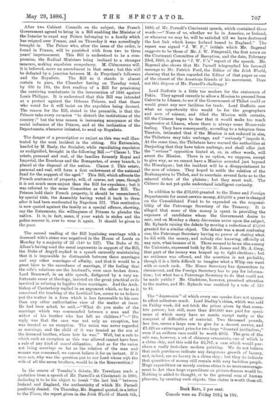The second reading of the Bill legalising marriage with a
deceased wife's sister was negatived in the House of Lords on Monday by a majority of 22 (149 to 127). The Duke of St. Alban's having used the usual arguments in support of the Bill, the Duke of Argyll replied in a speech earnestly maintaining that it is impossible to distinguish between these marriages and any other marriages of affinity, and that it would be a great blow to the sacredness of marriage, if the feeling that the wife's relations are the husband's, were once broken down. Lord Bramwell, in an able speech, disfigured by a. very un- fortunate sneer at theology, insisted on the great practical evils involved in refusing to legalise these marriages. And the Arch- bishop of Canterbury replied in an argument which, so far as it concerned the teaching of the Levitical law, seems to us to have put the matter in a form which is less favourable to his case than any other authoritative view of the matter at issue. He had been asked, he said,—" What do you make of the marriage which was commanded between a man and the widow of his brother who has left no children ?"—" His reply was that the case was not only an exception, but was treated as an exception. The union was never regarded as marriage, and the child of it was treated as the son of the deceased brother, whose heir he was." Well, but a rule to which such an exception as this was allowed cannot have been a rule of any kind of moral obligation. And as for the union not being marriage so far as the relation of the man and woman was concerned, we cannot believe it for an instant. If it were not, why was the question put to our Lord whose wife the wife of all the seven brothers, would be in the Resurrection ?


































 Previous page
Previous page